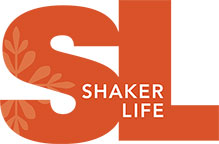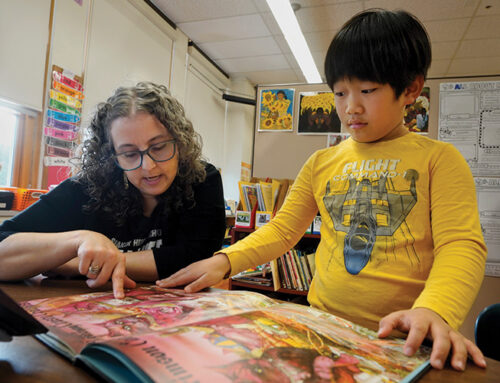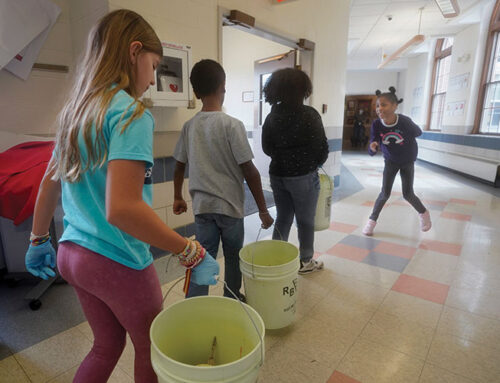2020 marks the 30th anniversary of the MAC Scholars Program at Shaker Heights High School. The peer-to-peer mentoring program has helped African American males as young as third grade develop their leadership skills and achieve academic success.
By Jennifer Kuhel
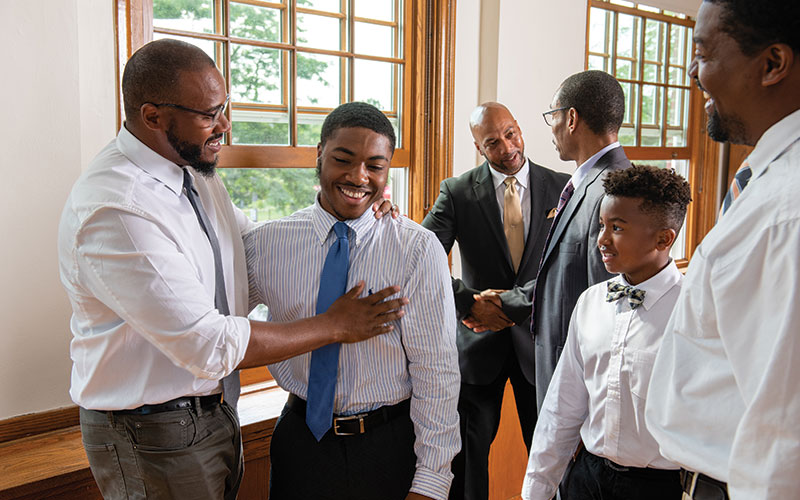
Left to right: Lomond MAC Scholars Advisor Ray Ratcliffe greets former Lomond student and MAC Scholar Khalil Abdullah as MAC Scholar Advisors Nate Reese and Hubert McIntyre, and Ratcliffe’s son Michael and Mercer MAC Scholars Advisor Derek White look on.
When retired Shaker heights high School academic advisor Mary Lynne Mcgovern looked over the list of 25 alumni who responded “yes” to her invitation to attend a special reunion this past June, she was thrilled at the prospect of seeing so many of her former students.
The group of alumni would be as old as 43 and as young as 19 – all African American men who were Minority Achievement Committee (MAC) Scholars, a student-led program aimed at improving the academic achievement and cultivating leadership qualities among young African American men at Shaker Heights High School.
It was the first reunion of MAC Scholars. Despite the various ages of the alumni, their shared experience of being MAC Scholars proved to be a more powerful bond than even McGovern had anticipated.
“They talked about how they’ve continued to be leaders after leaving Shaker and how they want to train young leaders,” she says. “They said they feel like they’re part of a special unit.”
Indeed, they are. MAC Scholars celebrates its 30th Anniversary in 2020. Since it began in 1990, 317 African American men have participated in the group, which McGovern helped found and served as an advisor to for 28 years. The alumni ranks include Rolling Stone columnist Jamil Smith (‘93) and M.I.T. Professor Cullen Buie (‘99) among other successful local and national leaders.
Since its beginnings at the High School, the program has expanded to the Middle School, then to Woodbury. Last year, it was offered to students in all five Shaker elementary schools.
True to its mission, the MAC Scholars program provides academic and leadership opportunities. But at its most fundamental level, MAC Scholars creates a positive social-emotional environment for its members through biweekly meetings and student-led discussions. That foundation enables them to develop their own sense of leadership and identity, which, in turn, leads to academic, personal, and life-long success.
The Early Years
The case for the MAC Scholars program began when McGovern was hired by the District in 1978 with funding from a grant to help implement the PUSH Excel program, an initiative started by Rev. Jesse Jackson and the Rainbow Coalition, to focus attention on African American student achievement. Much of her work involved meeting with Shaker Heights High School students who were highly capable, but who needed extra attention and academic support. McGovern monitored her students’ grades and counseled them on what they needed to do in order to become high-achieving students.

From left, Mercer MAC Scholar Michael Ratcliffe, Lomond MAC Scholar and 2019 SHHS graduating senior Khalil Abdullah, and MAC Scholar advisors
Ray Ratcliffe and Derek White.
Then in 1990, the High School created a Faculty Achievement Committee with the goal of narrowing the achievement gap. At the time, 70 percent of the African American male students entering their freshman year had a C average or below.
“We knew that we couldn’t have this information in our hands and ignore it,” McGovern says.
The committee shared the data with a group of eight African American male students who were juniors enrolled in Honors and Advanced Placement classes. “We told them that we needed to do something about this, but we needed their help to understand why this was happening,” she says.
After just one meeting with the students, it was clear the students had a plan of their own. “They told us that the younger students were tired of listening to their parents and teachers. They said they didn’t want adults telling them what to do. They told us that they’ve been in those students’ shoes and said that they needed to lead and develop the program themselves.”
Over the next semester, that group of students developed what would become the MAC Scholars program while McGovern and her co-advisor, Hubert McIntyre, kept a close watch.
The students identified potential members based on their grade point averages and categorized them into three groups which remain today: Potential Scholars, Emerging Scholars, and future MAC Scholars (juniors and seniors who have a B average and were enrolled in Honors and AP classes).
MAC Scholar Glenn Hunter wrote a pledge, which is still recited at the beginning of every meeting, and the scholars developed a two-week meeting cycle: MAC Scholars would meet with McGovern and McIntyre the first week to plan meetings for the Potential Scholars. The following week, the MAC Scholars would lead the Potential Scholars in small group discussions. The discussions included a variety of topics, from the college admission process to relationships to self-discipline. The idea was that MAC Scholars wouldn’t be lecturing Potential Scholars. On the contrary, they all spoke from personal experience. Finally, the MAC Scholars insisted on a signature dress code for
all meetings: dress shirt, tie and dress slacks, no exceptions.
McGovern and McIntyre were co-advisors of the program through the 2018 school year, when McGovern retired. Under their care, the program grew to include students as young as Grade 4. In addition, the MAC Sister Scholars program was started in 1997 to encourage leadership and academic achievement in African American female students (see sidebar below). McGovern and McIntyre were also asked numerous times to help other districts in Northeast Ohio and across the country start similar programs.
MAC Scholars Today
When McGovern retired last year, Nathaniel Reese, a long-time Woodbury teacher and Woodbury MAC Scholars advisor, was chosen to continue the program alongside McIntyre. In his first year, the program was expanded to all Shaker Heights Schools buildings.
While MAC Scholars was already available for students in Grades 5-12, it had only been offered to elementary students at Lomond.
“The idea of being a good student, a good citizen, and to understand what it means to have ambition and goals needs to start early,” Reese says. “And what we found was that at the lower levels, participation is driven by positive peer pressure. The kids see their peers becoming part of a special group and then they start asking the teachers how they can become involved.”
At the elementary schools, teachers recommend students whom they believe would benefit from participation, both socially and academically. Mercer second grade teacher Derek White (who is a 1989 graduate of Shaker Heights High School) advises the Mercer MAC Scholars and says the progress he saw in his students during the program’s first year there was remarkable.
“At this age, being a part of a group and knowing that you’re with other kids your age and that it doesn’t have to do with a sport or being on a team, is something that’s different and exciting for most of the boys,” White says. “By the end of the year, these kids were leaders and they were consistently making good choices in the classroom.”
MAC Scholars meetings are student driven at the elementary schools, just as they are at the upper levels. “At the beginning of the year, we outline what we’re going to talk about,” says Ray Ratcliffe, a Lomond paraprofessional and Class of 2002 alum who advises the Lomond MAC Scholars. “We give the young men the opportunity to tell us what they want to talk about because we want them to take ownership.”
“The kids see their peers becoming part of a special group and then they start asking the teachers how they can become involved.”
Ratcliffe’s son Michael, who attended Fernway, spent years at Lomond watching his dad lead the Scholars there. He couldn’t wait to join when he entered Woodbury last year. “It was so interesting to watch the kids at Lomond who were about my age talking together and doing cool projects,” Michael remembers. “MAC Scholars has taught me how to be a gentleman and how to be a young adult. And I know that I have to keep my grades up because if I don’t, that could affect whether I get to go on a field trip now, or play sports in high school, or whether I can get into a good college.”
Khalil Abdullah, a Class of 2019 MAC Scholar who received an International Baccalaureate Diploma, is currently a freshman at Vanderbilt University and plans to study civil engineering. Like Michael, he was invited to join MAC Scholars as a fifth grade student at Woodbury.
“It was advertised as a group for high-achieving African American students and I wanted to be a part of that. It made me feel that what I’d done so far in academics was validated,” he says. “MAC Scholars was so valuable to me because you have upper-classmen talking to the under-classmen, not just about school, but about black history, going on job interviews and other issues that are relevant to us. It’s more of a big brother relationship where, as Scholars, we could understand what it was like to be in Potential Scholars’ shoes while showing them what they needed to do to be in ours.”
MAC Moving Forward
This school year, MAC Scholars welcomed nearly 30 students into the High School with a B average or higher, its largest-ever incoming group and evidence that the program is making a difference at an earlier age. In addition, the number of Scholar leaders (the senior group) grew from 12 last year to 24 this year. Last year District-wide, MAC Scholar participation from grades 3-12 included nearly 200 students.
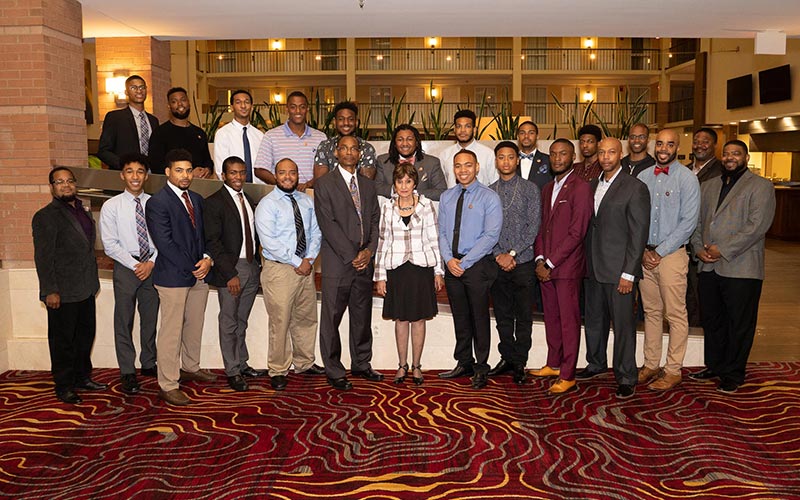
Retired MAC Scholars Advisor Mary Lynne McGovern (center) and Hubert McIntyre (to her right) pose with MAC Scholars from the past 29 years. Current MAC Scholars Advisor Nate Reese is also pictured (first row, third from the right).
McIntyre, who currently advises students at the High School and at the Middle School, is optimistic about the program’s growth and impact it has on students. “It amazes me how these young men are able to continue doing what they’re doing, given what they face as African American males in our country every day,” he says. “But at its heart, MAC Scholars has always been about giving back while moving forward. The content is always secondary and the relationships are primary. After all, if we don’t build relationships, then we’ll never know how smart these young men really are.”
Thanks to a successful reunion this year, McGovern, through the Shaker Schools Foundation McGovern Family Fund, will continue hosting MAC Scholar reunions annually (next year’s reunion is scheduled for June 13, 2020).
“We want to help build a network of Scholars because they’re in key leadership positions all over the country,” she says. “And we want to continue to share our story so that students will know where the MAC Scholars Program came from and where we are today.”
MAC Sister Scholars: Shapes Young Women into Leaders
After the successful start of the MAC Scholars Program, the MAC Sister Scholars for girls formed in 1997.
“Based on data, I think we tend to be more concerned about African American boys than girls,” explains Tracy Williams, co-advisor to the MAC Sister Scholars program. “But if something is affecting the boys, then it’s also affecting the girls, and it’s important not to overlook that.”
Like the MAC Scholars program, the MAC Sister Scholars originated at Shaker Heights High School. Today, students can enter the program as early as fifth grade at Woodbury. MAC Sister Scholars also is student-driven with a focus on mentoring younger students and community service.
“We talk about the issues that are important to teenagers. Sometimes, as adults, we forget how vulnerable they are at this age,” Williams says. “Often the girls are just as eager to talk about what it means to be a successful student or getting into college as they are to talk about natural hair care. The program is successful because the Sister Scholars are having discussions about what’s relevant to them.”
This year, the Sister Scholars intend to reach out more to students in grades K-4 to plant the seeds of interest at an even younger age.
“These programs are so important, especially given what we know about racial identity development in children,” Williams says. “It’s important that black students have spaces where their identity can be positively reflected back at them. Programs like MAC Scholars and MAC Sister Scholars prepare students to go out into the world feeling fully defined, just as we want all of our teens to feel when they leave high school.”
